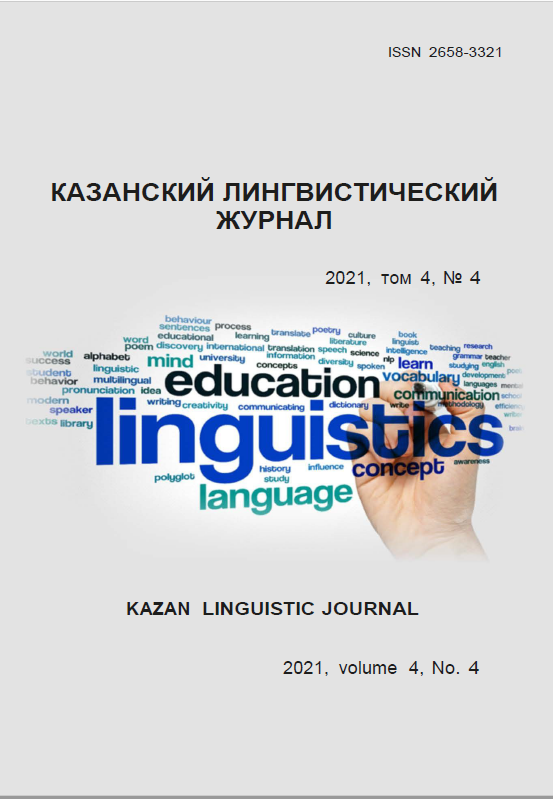On causes of translation errors
https://doi.org/10.26907/2658-3321.2021.4.4.565-581
Keywords:
translation error, hypnotic power of a word, unconsciousness, neurolinguistics, psycholinguistics, Russian, Italian languageAbstract
The present study is aimed to investigate and analyse the causes of translation errors made by Italian students who study Russian as a foreign language, in order to provide possible explanations and to improve their translation ability. To this extend, the verbal sign is analysed from the point of view of psycholinguistics. A sign, as a chain of signifiers, can generate a series of associations, both connected and not connected to the signified, and as an external stimulus activates the unconsciousness. The unconsciousness is embedded in the act of thinking and participates in the thought along with consciousness, so generates associative connections based on the translator’s imagination and personal experience with the verbal sign, which leads to an erroneous understanding of the lexeme in the context. The unconsciousness can be manifested when student translates a text from his native language, Italian, into a non-native, Russian. And since the native language is the unconscious knowledge of linguistic rules, or “competence” (N. Chomsky, 1965), so the competence has never been the object of the native speaker’s conscious analysis. But now the verbal sign should be analysed not only from a functional point of view, but from a metalinguistic one. This new specific work with a word, as an object of translation, is the central point that can lead to an error.
References
References
Komissarov V.N. Theory of translation (linguistic aspects). Moscow: Vysshaya shkola; 1990.
Latyshev L.K. Translation technology. Moscow: “Akademiya”; 2005.
Latyshev L.K. Problems of theory, practice and methods of teaching translation. Moscow: «Prosveshcheniye», 1988.
Garbovsky N.K. Theory of translation. Moscow: Izdatel'stvo Moskovskogo universiteta; 2004.
Kunilovskaya M.A. Classification of translation errors for creating markup in the educational parallel Russian Learner Translator Corpus: Linguistics and translation. Tyumen: Lingua mobilis. 2013; 1 (40): 141¬–158.
Salmon L. Theory of translation. Milan: Angeli; 2017. (In Italian)
Osimo B. Translator's manual. Milan: Hoepli; 2019. (In Italian)
Robinson D. Becoming a Translator. Routledge; 2019.
Erikson M. My voice will stay with you. Moscow: “XXI vek”; 1995.
Jung K.G. Consciousness and the unconscious. Moscow: “Akademicheskiy proyekt”; 2009.
Schopenhauer A. Complete works in 6 volumes: vol. 2, vol. 3. Moscow; 1910, (repr. 2001): 132–144, 851¬–862.
Freud S. Psychology of the unconscious. St. Petersburg: “Piter”; 2002.
Monakhova I.A. Textbook of hypnosis. How to be able to inspire and resist suggestion. Moscow: “Ripol klassik”; 2010.
Gurevich P.S. Philosophy: textbook for SPO. Moscow: Izdatel'stvo “Yurayt”; 2018.
Rozhkov N.T. Psychoanalytic pedagogy: theory and technology. Oryol: “MABIV”; 2013.
Vygotsky L.S. Thinking and speech. Moscow: Izdatel'stvo “Labirint”; 1999.
Lacan J., Seminars. The formation of the unconscious. Book 5. Moscow: “Gnozis/Logos”; 2002.
Vlakhov S., Florin S. Untranslatable in translation. Moscow: “Mezhdunarodnyye otnosheniya”; 1980.
Chomsky N. Aspect оf the Theory of Syntax. Cambridge: Massachusetts Institute of Technology; 1965.
Shcherba L.V. Language system and speech activity. About the threefold aspect of linguistic phenomena and about an experiment in linguistics. Moscow: Nauka; 1974.
Goethe I.V. Faust, trans. B.Pasternak. Moscow: “Azbuka”; 2021.
De Saussure F. General Linguistics course. Yekaterinburg: Izdatel'stvo Ural’skogo universiteta; 1999.
Kobzeva O.V. On the issue of errors in the translation of students-Italophanes: A collection of materials of the VII International Forum IFTE. Kazan; 2021.
Suvorova A.N. Introduction to Philosophy. Kyiv: Biblioteka Fonda sodeystviya razvitiyu psikhicheskoy kul’tury; 2005.






